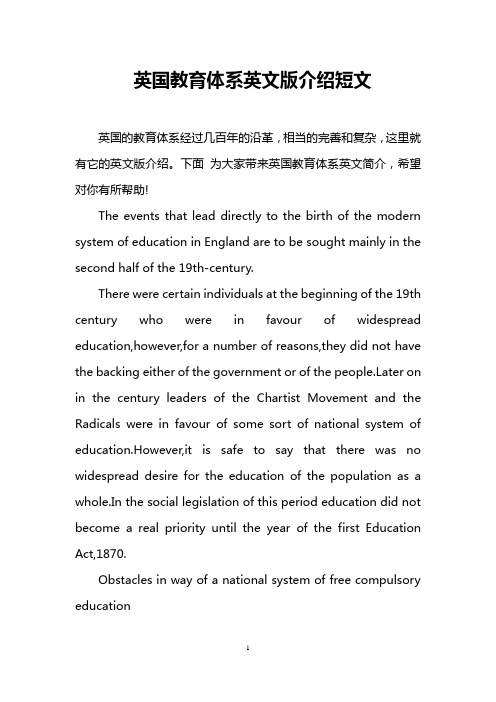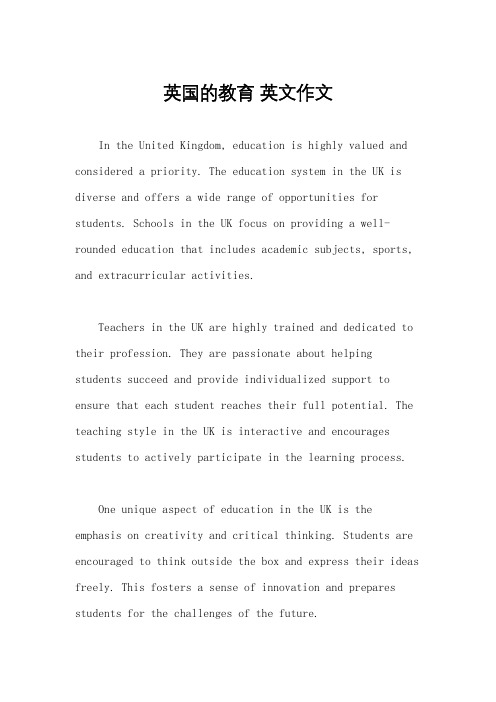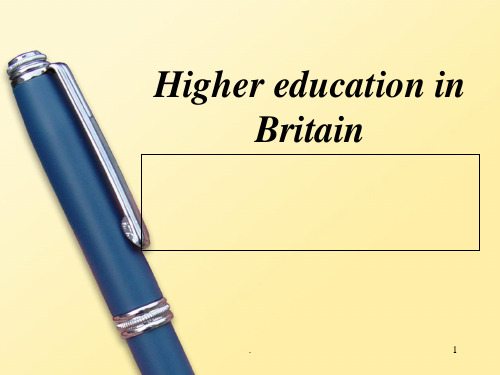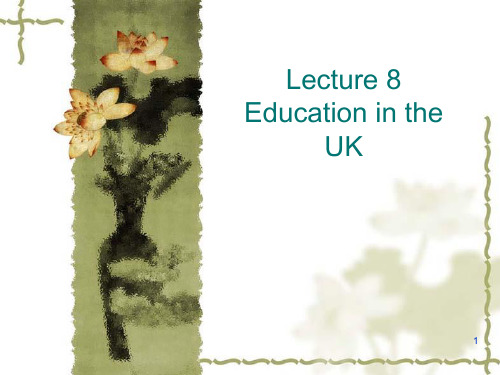Education in UK&U.S.A2
英一2024小作文模板

英一2024小作文模板英文回答:Topic: How to improve education in the UK。
Education is the key to success in the UK. It provides individuals with the skills and knowledge they need to succeed in the workplace and in life. However, the UK education system is facing a number of challenges, including:Underfunding: The UK government has been cutting funding for education in recent years. This has led to larger class sizes, fewer teachers, and a decline in the quality of education.Inequality: The UK education system is not equal for all students. Students from disadvantaged backgrounds are more likely to attend underfunded schools and to fail to achieve their potential.Curriculum: The UK curriculum is too narrow and doesnot prepare students for the challenges of the 21st century.There are a number of things that can be done toimprove education in the UK. These include:Investing in education: The UK government needs to invest more money in education. This will allow for smaller class sizes, more teachers, and a higher quality of education.Creating a more equitable education system: The UK government needs to take steps to create a more equitable education system. This includes providing more funding to schools in disadvantaged areas and supporting students from disadvantaged backgrounds.Reforming the curriculum: The UK government needs to reform the curriculum to make it more relevant to the needs of students in the 21st century. This includesincorporating more STEM subjects, critical thinking skills,and problem-solving skills.By taking these steps, the UK government can improve education for all students and help them to succeed in the workplace and in life.中文回答:主题,如何改善英国教育。
UK Education 英国教育

universities in the world.
This picturesque town, built where an ancient bridge crossed the River Cam <Cam-Bridge>, is best known for its university.
College system
Student tutorials are generally more academically challenging and rigorous than standard lecture and test format courses, because during each session students are expected to orally communicate, defend, analyze, and critique the ideas of others and their own in conversations with the professor and fellow-students. As a pedagogic model, the tutorial system has great value because it creates learning and assessment opportunities which are highly authentic and difficult to fake
Winchester College is a well-known boys' independent school, in the city of Winchester in Hampshire and is commonly considered to be amongst the most academic of all schools in the United Kingdom.
英国教育体系英文版介绍短文

英国教育体系英文版介绍短文英国的教育体系经过几百年的沿革,相当的完善和复杂,这里就有它的英文版介绍。
下面为大家带来英国教育体系英文简介,希望对你有所帮助!The events that lead directly to the birth of the modern system of education in England are to be sought mainly in the second half of the 19th-century.There were certain individuals at the beginning of the 19th century who were in favour of widespread education,however,for a number of reasons,they did not have the backing either of the government or of the ter on in the century leaders of the Chartist Movement and the Radicals were in favour of some sort of national system of education.However,it is safe to say that there was no widespread desire for the education of the population as a whole.In the social legislation of this period education did not become a real priority until the year of the first Education Act,1870.Obstacles in way of a national system of free compulsory educationThe establishment of a national system of education came late in England mainly because of the social,economic and religious climate of the century.1.The higher classes of society had no interest in advocating the cultural development of the working classes.On the contrary,the effects of the revolutionary spirit in Europe reinforced conservative attitudes that were certainly not conducive to advocating the development of the critical faculties of the people as a whole.2.Neither did the vast majority of the working class have any real interest in education.Child labour was common practice in this period and working-class families were very reluctant to give up the earnings of their children for the benefit of education.The employment of children continued to increase even after 1850.3.Also the effect of Protestantism,with its emphasis on individualism,personal salvation,the private reading and interpretation of Scripture,ran contrary to any sort of collectivist thought.4.Religious conflict also delayed the establishment of a national system of education.One example of this can be seen in the reaction to the clauses regarding education in the 1843Factory Bill.There was violent opposition on the part of nonconformists and Catholics alike because,according to the Bill,headmasters had to be of the Church of England.Furthermore,the children were to be taught the catechism and be present at liturgical celebrations as well as service on Sundays.The Bill failed.5.The idea of secular education had never been popular during the cation had almost exclusively been under the control of the established church.Furthermore,we should not forget the conflict between secular and religious thought that characterised the century,especially the latter half.Given the cultural and religious climate of the century it became obvious that any nondenominational system of education would be well nigh impossible.It was only in the 20th century,with the rise of indifference towards religious teaching,that general nondenominational schooling became possible.Denominational education was further reinforced by the increase in the Catholic population due to the wave of Irish immigrants during and following the Great Famine in Ireland (1845-50).6.It was also thought that the voluntary school system was quite successful and that it was better not to encouragegovernment intervention.Furthermore,the dominant laissez-faire theory of the time meant that,as in most areas,any direct intervention on the part of the state in the field of education was to be discouraged.The state was only too happy to leave education to the private sector,voluntary or cation could not constitute an exception to the tenaciously upheld doctrine of laissez-faire.However,these voluntary institutions did not have the influence or power to construct a nationwide system.Economic development and the increase of wealth were seen to be priority issues.The question of education only attracted very limited attention.Tendencies and events favouring national educationNot everything was negative; there were quite distinct undercurrents of thought beginning to emerge that eventually led to the 1870 Education Act.During the century,and particularly during the second half,we have the beginnings of a national system of education that owes its birth to many factors.1.From the first decade of the 19th-century there emerged indications of new thinking in the field of education.Of particular interest is the Bill introduced into theHouse of commons by Samuel Whitbread in 1807.2.In 1807 Samuel Whitbread proposed to deal with the whole of the Poor Law with the introduction of a Bill in the House of Commons.Of particular interest is the first part of the Bill,which dealt specifically with education.Whitbread advocated making the parish responsible for education and proposed that each child should have two years of education between the ages of 7 and 14.He thought this would reduce crime and pauperism.3.It was considered too expensive to implement and it was also thought that the introduction of such a scheme would take the people away from manual work and make them dissatisfied with their social situation.Although unsuccessful the thought of generalised education for the masses was even then being expressed and was later to be reiterated constantly throughout the century eventually leading up to the 1870 Education Act.4.The idea of widespread education was also helped by the gradual increase in collectivist thought especially after 1865.This is quite evident in the works of Carlyle and Ruskin.It was only after this date that any idea of widespread state intervention in the field of education could find fertile ground.5.The various Factory Acts of 1833,1844,and 1867 were another contributory factor towards the general tendency towards national education.These acts focused not only on the condition of workers but they also had the effect of imposing certain restrictions on child labour,which in turn favoured the opportunity of an alternative:education for the child.6.In the second half of the 19th-century crime and pauperism increased,so did riots strikes and social unrest.The commercial and manufacturing supremacy of Britain was in decline and this was seen to be mostly due to the fact that other European countries had a more developed technical education system.Political stability and economic prosperity now seemed to be associated with the education of the cation now seemed financially viable.7.In 1869 two other societies were established:the Education League,which turned secular and the National Education Union,which was conservative and Anglican.It was mainly due to these two societies that the Education Act of 1870 was passed.The Education Act of 1870It was with the Education Act of 1870,also known as the "Forster Act",that we have the real birth of themodern system of education in England.This not only gave rise to a national system of state education but also assured the existence of a dual system - voluntary denominational schools and nondenominational state schools.The act required the establishment of elementary schools nationwide.These were not to replace or duplicate what already existed but supplement those already run by the churches,private individuals and guilds.The country was divided into school districts and in those areas where there was inadequate provision school boards were to be elected.These were responsible for raising sufficient funds to maintain the schools.The schools were often called " board schools".These elementary schools had to be non-denominational.The school boards could charge a weekly fee not exceeding 9 pence.For a limited period the school boards could pay the fees if the parents were unable to do so.The Voluntary Schools could also receive such payment of fees from the school boards.They had to guarantee attendance for all children in their respective districts between the ages of 5 and 13.The School Board could appoint officers to enforce attendance.Theseofficers or "Board Men",as they were commonly known,became one of those terribly menacing figures firmly implanted in the minds of young schoolboys.This figure was an effective deterrent in playing truant.All the more menacing because the child could only picture him in his imagination (if he faithfully attended school,that is!).He was also known as the School Attendance Officer.Religious instruction was an integral part of the school curriculum but was not compulsory.This was to be nondenominational.Since 1870 Voluntary Schools declined except Roman Catholic Schools because Boards Schools provided better buildings and higher pay for teachers.Elementary education became effectively free with the passing of the 1891 Education Act.英国教育体系介绍英国教育体系总体来说分为三个阶段:义务教育(Compulsory Education),延续教育(Further Education)和高等教育(Higher Education)。
英国教育体系英文版介绍短文

英国教育体系英文版介绍短文The events that lead directly to the birth of the modern system of education in England are to be sought mainly in the second half of the 19th-century.There were certain individuals at the beginning of the 19th century who were in favour of widespread education,however,for a number of reasons,they did not have the backing either of the government or of the ter on in the century leaders of the Chartist Movement and the Radicals were in favour of some sort of national system of education.However,it is safe to say that there was no widespread desire for the education of the population as a whole.In the social legislation of this period education did not become a real priority until the year of the first Education Act,1870.Obstacles in way of a national system of free compulsory educationThe establishment of a national system of education came late in England mainly because of the social,economic and religious climate of the century.1.The higher classes of society had no interest in advocating the cultural development of the working classes.On the contrary,the effects of the revolutionary spirit in Europe reinforced conservative attitudesthat were certainly not conducive to advocating the development of the critical faculties of the people as a whole.2.Neither did the vast majority of the working class have any real interest in education.Child labour was common practice in this period and working-class families were very reluctant to give up the earnings of their children for the benefit of education.The employment of children continued to increase even after 1850.3.Also the effect of Protestantism,with its emphasis on individualism,personal salvation,the private reading and interpretation of Scripture,ran contrary to any sort of collectivist thought.4.Religious conflict also delayed the establishment of a national system of education.One example of this can be seen in the reaction to the clauses regarding education in the 1843 Factory Bill.There was violent opposition on the part of nonconformists and Catholics alike because,according to the Bill,headmasters had to be of the Church of England.Furthermore,the children were to be taught the catechism and be present at liturgical celebrations as well as service on Sundays.The Bill failed.5.The idea of secular education had never been popular during the cation had almost exclusively been under the control of the established church.Furthermore,we should not forget the conflict between secular and religious thought that characterised the century,especiallythe latter half.Given the cultural and religious climate of the century it became obvious that any nondenominational system of education would be well nigh impossible.It was only in the 20th century,with the rise of indifference towards religious teaching,that general nondenominational schooling became possible.Denominational education was further reinforced by the increase in the Catholic population due to the wave of Irish immigrants during and following the Great Famine in Ireland (1845-50).6.It was also thought that the voluntary school system was quite successful and that it was better not to encourage government intervention.Furthermore,the dominant laissez-faire theory of the time meant that,as in most areas,any direct intervention on the part of the state in the field of education was to be discouraged.The state was only too happy to leave education to the private sector,voluntary or cation could not constitute an exception to the tenaciously upheld doctrine of laissez-faire.However,these voluntary institutions did not have the influence or power to construct a nationwide system.Economic development and the increase of wealth were seen to be priority issues.The question of education only attracted very limited attention.Tendencies and events favouring national educationNot everything was negative; there were quite distinct undercurrents of thought beginning to emerge that eventually led to the 1870 Education Act.During the century,and particularly during the second half,we have the beginnings of a national system of education that owes its birth to many factors.1.From the first decade of the 19th-century there emerged indications of new thinking in the field of education.Of particular interest is the Bill introduced into the House of commons by Samuel Whitbread in 1807.2.In 1807 Samuel Whitbread proposed to deal with the whole of the Poor Law with the introduction of a Bill in the House of Commons.Of particular interest is the first part of the Bill,which dealt specifically with education.Whitbread advocated making the parish responsible for education and proposed that each child should have two years of education between the ages of 7 and 14.He thought this would reduce crime and pauperism.3.It was considered too expensive to implement and it was also thought that the introduction of such a scheme would take the people away from manual work and make them dissatisfied with their socialsituation.Although unsuccessful the thought of generalised education for the masses was even then being expressed and was later to be reiterated constantly throughout the century eventually leading up to the 1870 Education Act.4.The idea of widespread education was also helped by the gradual increase in collectivist thought especially after 1865.This is quite evident in the works of Carlyle and Ruskin.It was only after this date that any idea of widespread state intervention in the field of education could find fertile ground.5.The various Factory Acts of 1833,1844,and 1867 were another contributory factor towards the general tendency towards national education.These acts focused not only on the condition of workers but they also had the effect of imposing certain restrictions on child labour,which in turn favoured the opportunity of an alternative:education for the child.6.In the second half of the 19th-century crime and pauperism increased,so did riots strikes and social unrest.The commercial and manufacturing supremacy of Britain was in decline and this was seen to be mostly due to the fact that other European countries had a more developed technical education system.Political stability and economic prosperity now seemed to be associated with the education of the cation now seemed financially viable.7.In 1869 two other societies were established:the Education League,which turned secular and the National Education Union,which was conservative and Anglican.It was mainly due to these two societies that the Education Act of 1870 was passed.The Education Act of 1870It was with the Education Act of 1870,also known as the Forster Act,that we have the real birth of the modern system of education in England.This not only gave rise to a national system of state education but also assured the existence of a dual system - voluntary denominational schools and nondenominational state schools.The act required the establishment of elementary schools nationwide.These were not to replace or duplicate what already existed but supplement those already run by the churches,private individuals and guilds.The country was divided into school districts and in those areas where there was inadequate provision school boards were to be elected.These were responsible for raising sufficient funds to maintain the schools.The schools were often called board schools.These elementary schools had to be non-denominational.The school boards could charge a weekly fee not exceeding 9 pence.For a limited period the school boards could pay the fees if the parents were unable to do so.The Voluntary Schools could also receive such payment of fees from the school boards.They had to guarantee attendance for all children in their respective districts between the ages of 5 and 13.The School Board could appoint officers to enforce attendance.These officers or Board Men,as they were commonly known,became one of those terribly menacing figures firmly implanted in the minds of young schoolboys.This figure was an effective deterrent in playing truant.All the more menacing because the child could only picture him in his imagination (if he faithfully attended school,that is!).He was also known as the School Attendance Officer.Religious instruction was an integral part of the school curriculum but was not compulsory.This was to be nondenominational.Since 1870 Voluntary Schools declined except Roman Catholic Schools because Boards Schools provided better buildings and higher pay for teachers.Elementary education became effectively free with the passing of the 1891 Education Act.英国教育体系介绍英国教育体系总体来说分为三个阶段:义务教育(Compulsory Education),延续教育(Further Education)和高等教育(Higher Education)。
英国的教育 英文作文

英国的教育英文作文In the United Kingdom, education is highly valued and considered a priority. The education system in the UK is diverse and offers a wide range of opportunities for students. Schools in the UK focus on providing a well-rounded education that includes academic subjects, sports, and extracurricular activities.Teachers in the UK are highly trained and dedicated to their profession. They are passionate about helping students succeed and provide individualized support to ensure that each student reaches their full potential. The teaching style in the UK is interactive and encourages students to actively participate in the learning process.One unique aspect of education in the UK is the emphasis on creativity and critical thinking. Students are encouraged to think outside the box and express their ideas freely. This fosters a sense of innovation and prepares students for the challenges of the future.The UK education system also values cultural diversity and promotes inclusivity. Schools in the UK have a multicultural environment where students from different backgrounds and cultures come together to learn and grow. This helps students develop a global perspective and promotes tolerance and understanding.In addition to traditional classroom learning, the UK education system also focuses on practical skills and real-world experiences. Students have the opportunity to participate in internships, work placements, and apprenticeships, which provide them with valuable hands-on experience and prepare them for the workforce.Furthermore, the UK education system encourages independent learning and self-motivation. Students are given the freedom to explore their interests and pursue their passions. This helps them develop a sense of responsibility and prepares them for higher education or future careers.Overall, education in the UK is characterized by its diversity, creativity, and emphasis on practical skills. It prepares students not only academically but also socially and emotionally for the challenges of the future. The UK education system is constantly evolving to meet the needs of a changing world and continues to produce well-rounded individuals who are ready to make a positive impact on society.。
Higher-education-in-British英国高等教育简介PPT课件

.
10
2. Funding
• The vast majority of United Kingdom universities are government financed, with only one private university--the University of Buckingham, where the government does not subsidize the tuition fees.
.
14
Higher education
—undergraduate study
➢ A bachelor degree (BA, BSc, etc) can be obtained by a minimum of three year’s study at one of the more than 200 universities or institutions of higher education in the UK offering degree courses.
.
12
• There are about 40,000 full time university teachers paid wholly from university funds. About 1 in 6 of all university teachers are professors.
.
• British higher education has become a mass system, enrolling about a third of the age group. Approximately 1.8million students currently are in the higher education system. There are 114 university institutions (and 60 higher education colleges) in the UK, counting separately the constituent colleges of the federal universities of Wales and London. In addition, higher education programs are offered in many further education colleges.
英国教育简介

National curriculum
All government-run schools, state schools, follow the same National Curriculum. courses : English, mathematics, science, technology, physical education, religion, history, geography, music ,art , foreign language
15
GCSE (GCE O level) 普通中等教育证书 is taken at the end of compulsory education at the age of 16. All the students are required to take it. The results often help the students and their parents to made a choice whether they will go to college or not.
18
Grammar schools in the United Kingdom
The oldest schools in the U.K. a secondary school attended by pupils aged 11 to 18. The entry to grammar schools is controlled by means of an academically selective process consisting, largely or exclusively, of a written examination . (“11-plus” examination) Those with the highest marks go to grammar schools lay emphasis on advanced academic subjects rather than more general curriculum of the comprehensive schools.
英美概况 Secondary Education in the UK

a
11
Rugby School
(1567)
The game of Rugby
Football was
invented here. The
school's most
notable headmaster
was Thomas Arnold.
Appointed in 1828 he
executed many
Public schools are fee-paying schools for students aged 11 (or 13) to 18.
a
8
Eton College
(1440)
It was founded in 1440 by King Henry VI, is a British Independent School for boys aged 13 to 18. So far, about 20 British prime ministers were educated at ndent Schools
Preparatory schools
Public schools
Direct- grant grammar schools
a
7
Preparatory schools are usually called prep schools that prepare children in the age range from 7 to 13 for entry to public schools.
school in England and Wales. Only about 3% state school pupils are grammar schools.
